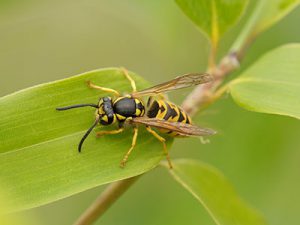Bees in the ground around your home can be a significant issue. Of the two bees that you can have each has a different biology, habitat and method of control. If you have these problems here is how a professional pest management company should be dealing with it.
Bees in the ground are actually wasps

Most often when we receive a call for a wasp nest in the ground it’s likely yellow jackets. Yellow jacket queen’s have the nasty habit of building nests in the soil. More often than not a homeowner doesn’t know about it until it’s to late.
Around the months of August and September yellow jacket nests are at their peak size. Unfortunately, since it’s also still summer your lawn needs to be mowed. Whether you’re alert or not you may unknowingly run over a wasp nest in the ground. If you do you’re going to get stung. The likelihood also is that it won’t just be one wasp it will be multiple.
When called to jobs like this our service staff will wear a full protective suit and treat the nest directly with a bit of liquid insecticide. The product is injected directly into the nest and within 24 hours adequate control will be achieved.
In some cases, particularly at schools where pesticides are not allowed the nest can actually dug up. Once finished the nest can be removed and workers removed with a vacuum. While this scenario is unusual it certainly does happen.
Wasps digging holes all over the lawn
The digger bee is a small wasp. In the spring they will dig holes into the soil and deposit eggs. The eggs hatch and sadly the problem gets worse year after year as each generation gets larger.
Up until a few years ago we avoided these types of jobs for two reason. The first being that although they look aggressive you’re unlikely to be stung. The second reason is that the areas where the wasps are digging is usually very large.
In Connecticut all pesticide applicators are licensed in general pest control, termite control, lawncare as well as other specialties. If the areas to be treated are away from the home and large enough it becomes a lawncare issue. The problem is that most lawncare applicators don’t want the service.
Fortunately, as the owner of Envirocare Pest Control I’m licensed in many categories and can provide the service in most cases.
Controlling wasps in the ground and lawn has difficulties
When approached with a digger bee job a few things need to be taken into account.
The first is that the reason why digger bees are there in the first place is that the lawn in the effected area isn’t growing well. If the lawn was in good shape this pest would be crowded out and not be a problem. Sadly, not everyone has a green thumb, my self included.
A second issue is that the holes themselves are not treated, it’s the entire area. The problem with this method of treatment is that depending on the size it may be too big for a pest control company to handle. Lawncare companies can be better suited for this work because of the equipment they have. However, as I said we will treat 90% of the calls we get as the service offering is becoming more popular.
How to treat digger bees
Digger bee treatment, if it must be done is a two step process. The procedure is as follows:
- We spread an insecticidal granule over the entire effected area. NOT just the holes themselves. Once the product is applied it must be watered in with an inch of water so the granules dissolve. After this a lethal dose will be delivered when holes are re-dug
- We then treat the entire area with a liquid insecticide mainly around the holes to give the process a jump start
Last, and most importantly when we leave leave there we be a final set of directions that includes staying off the area for 24 hours and more importantly to replant grass. Ultimately, the latter is the best bet for multiple years of control.
Wasps and digger bees are a real issue in Connecticut lawns. Not all wasps and bees should be exterminated, but when it must happen the process has to be done properly or failure is likely.
If you have bees in the ground or other pests, call Envirocare Pest Control at 1-888-879-6481. We can help.
